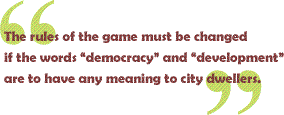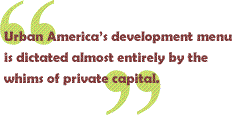Progressive City Leaders, Progressive Urban Politics and Policies
Urban Agenda has always been intended to be a group blog. But the people initially targeted to contribute have blogs and lives of their own... so it's never really gotten off the ground, and I in turn directed my blogging energies toward Rebuilding Place in the Urban Space.
Maybe the original idea for this blog is a little limiting, focusing on running a progressive urban-focused presidential candidate. Maybe the focus should be on building progressive urban politics at the city level. Too many of our cities are desperate, but the politics and policies pursued are no different, haven't changed in response to the real change in the political climate, the waning interest in city issues, at the federal level.
Something I keep forgetting to blog about is that a couple weeks ago, the World Urban Forum was held in Vancouver, British Columbia. Neither the New York Times nor the Washington Post wrote about it. Maybe they didn't even send a reporter? The Toronto Star ran a number of good articles about the Forum, such as this column by Christopher Hume, "A local problem on a global scale." Interestingly, while the U.S. is now officially more suburban than urban, the world is becoming increasingly urban, with population of the cities skyrocketing.
Also in the Star, Where is Toronto at forum on cities? (and we could ask the same question of U.S. cities) and "How universities can help Canada's troubled cities: Schools have wealth of knowledge, power, prestige."
__________

Somehow I missed this blog comment in response to an entry about Norman Mineta, based on a Neal Peirce column ("That's right: 23 lanes of traffic") about Mineta's pro-car turn as Secretary of Transportation. Here's what rg wrote:
Pierce writes rally good stuff -- much better than many regular Post columnists. I don't understand why the Post doesn't run his column. I think perhaps it signals their complete and utter lack of interest in urban issues.
To me, Norm Mineta personifies a tragic generation of urban leaders that sold out our cities to the car. Although he is somewhat redeemed by his being one of the authors of ISTEA, his tenure as DOT Secretary means that he will always be remembered as the point man in the Bush Administration's war on intercity passenger rail and urban rail transit. Our cities need fewer mayors like Norm Mineta and more like Rocky Anderson.
I hate to admit that I didn't know who Rocky Anderson is, so I looked him up. He's the Mayor of Salt Lake City, and he's a Democrat in a solidly Republican state, and he's not a member of the Mormon Church.
One of the cites in the piece on Mayor Anderson is to an article from The Nation, about "Progressive City Leaders," which makes for interesting reading, with short profiles on 8 councilmembers-mayors from across the country.
Not necessarily a progressive, but for change, is Cory Booker, the new mayor of Newark, New Jersey. I was really troubled to read a Post article about him earlier in the week, "Urban Legend," subtitled "How Cory Booker Became Newark's Mayor: By Being Almost Too Good to Be True" and to see how he attributed "spiritualism" read religion to change. From the article:
It really changed my perceptions about power," says Booker, who is wearing a blue oxford shirt and a yellow tie and speaking, as he always does, like a man in a rush. "It's not about the office that you hold or the money in your bank account. Real power never stems from agencies. It stems from spiritual power."
I think it stems from what I call "civic heart," what Erik Erikson called "generativity," and out of what Amitai Etzioni calls "communitarianism." My "faith" is that people care about others, and society and the quality of life for themselves, their families, their neighbors, their community, and their country. I think we need to save ourselves, not look to God or others to do it for us.
Another nice piece from The Nation is Urban Archipelago, about how "a growing number of progressives are taking their stand at the municipal level." From the article:
"Local governments are the only place where progressive ideas can get any traction--where big ideas are being tried," says Madison, Wisconsin, Mayor Dave Cieslewicz, 46, a former chief of staff in a State Senate office and an environmental leader who was elected in 2003. "Cities are where you can break through the big money, the media spin--everything that is wrong with our politics--and capture the public's imagination."
Unfortunately, he says, traditional organizations of local officials have been slow to catch the wave of municipal resistance to the nation's conservative moment. "I went to my first US Conference of Mayors meeting after I got elected, and I was horrified. The corporate influence was pervasive," Cieslewicz says, recalling a dinner where toy trucks featuring the Waste Management, Inc. logo served as party favors. "Here we were, with education, transportation and housing programs that are essential for cities facing cuts, and I just didn't see the sense of urgency."
I guess we'll have to take that on for the next round of elections in DC. Except for sitting Councilmember Phil Mendelson, who is opposed by a strongly pro-business candidate. This anti-Phil candidate is funded by business interests, but running a populist campaign. It reminds me of seemingly pro-recycling but anti-deposit/bottle bill campaigns funded by industry with names like "Citizens for Recycling Choice"). I think it's fair to say that we don't have much going in the way of a "progressive agenda" in DC City Politics.
Another interesting take on this issue is the five-part series from the e-magazine Black Commentator, "Wanted: A Plan for Cities to Save Themselves." The first two pieces focus on the role of Black Labor, the third on Urban Power, the fourth on how the Wal-Mart issue is aiding organizing within the cities, and the fifth is on the creation of a new democratic urban movement.
 Call out quotes from the Black Commentator.
Call out quotes from the Black Commentator.



0 Comments:
Post a Comment
<< Home